If you’ve been crawling through Reddit, YouTube reviews, or trying to figure out what monitor to snag during sales, you’ve probably stumbled into the LG vs Samsung debate. We get it. It’s a classic toss-up, like Intel vs AMD or Coke vs Pepsi, and each camp has its loyal fans.
We at Best Monitor Radar have tested, daily-driven, and even swapped between LG and Samsung monitors for gaming, productivity, and casual Netflix sessions. Here’s what we’ve learned so you don’t waste your money or time.
Overview of LG and Samsung as Monitor Brands
LG has carved a name for itself with reliable IPS panels that show consistent colors, wide viewing angles, and solid build quality. Their UltraGear lineup is a familiar name for gamers, while UltraWide models are a go-to for productivity and editing.
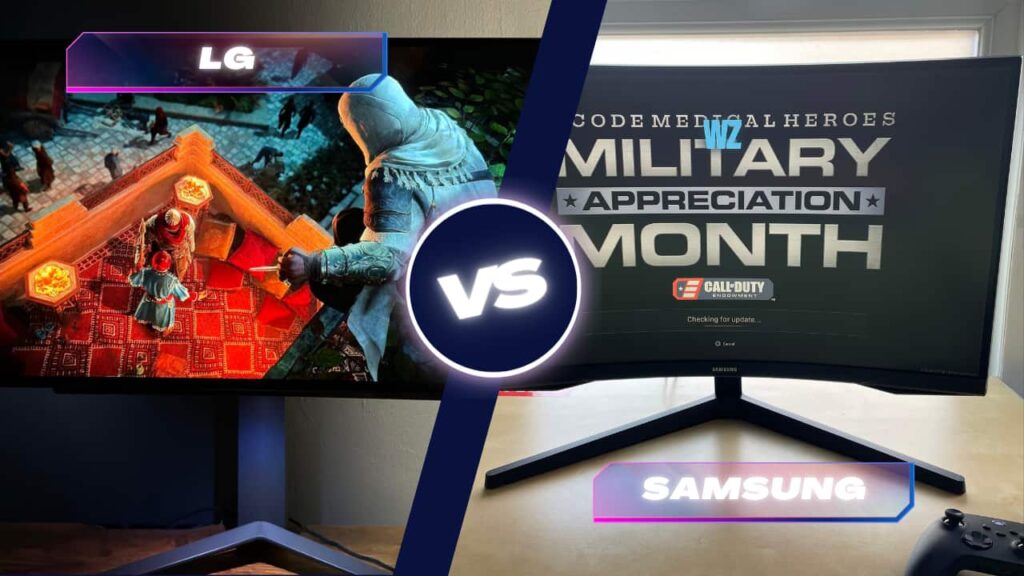
Samsung, on the other hand, has been pushing curved VA panels, deep blacks, and punchy contrast. Their Odyssey series has a cult following among gamers who want that 1000R curve and cinematic immersion.
“I switched to a Samsung Odyssey G7 from my LG UltraGear, and man, gaming at night feels like I’m inside the game.” – Reddit /r/Monitors user
If you care about color work, LG generally wins. If you want gaming immersion and deep contrast, Samsung is hard to beat.
Display Technology Differences
Panel Types: IPS vs VA
LG’s IPS panels offer better viewing angles and consistent colors, which is handy if you’re working on color edits, sharing your screen, or moving around your workspace.
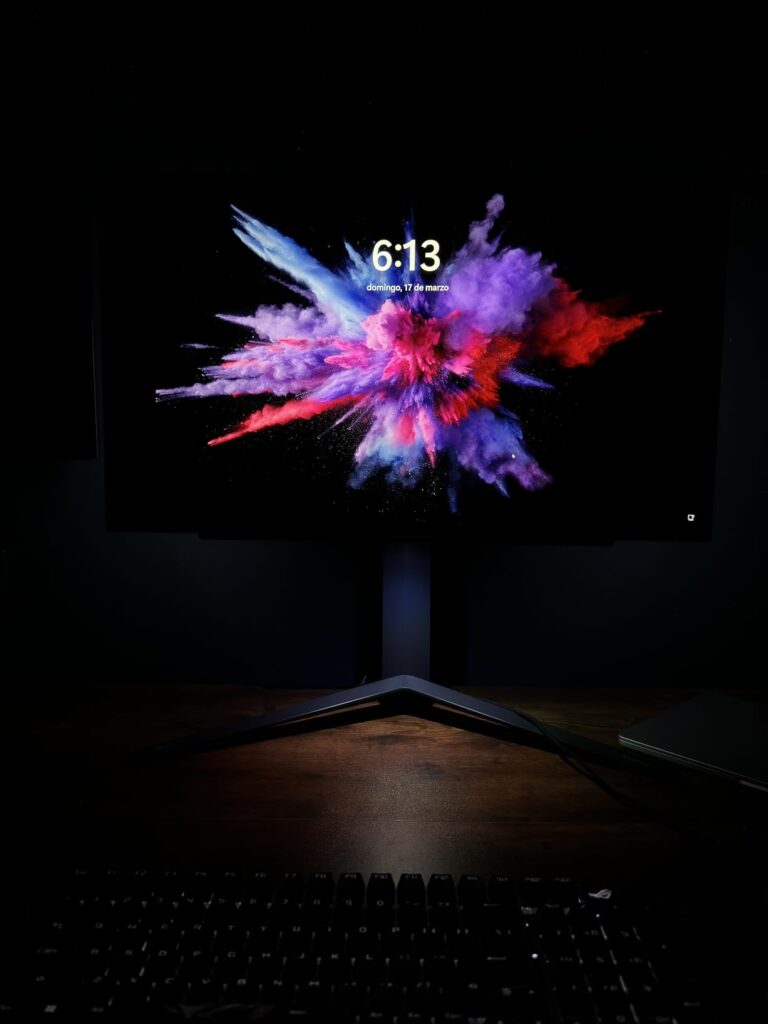
Samsung’s VA panels bring richer blacks and higher contrast, making them a joy for gaming in dark environments or for movie nights.
“Love my Samsung VA for gaming, but it’s not great for color grading videos.” – YouTube commenter
Color Accuracy and Contrast
LG’s Nano IPS panels are well-regarded for accurate colors out of the box. If you’re a photographer or video editor, that matters. Samsung panels can look vibrant, but you might need a bit of calibration if you’re doing color-critical work.
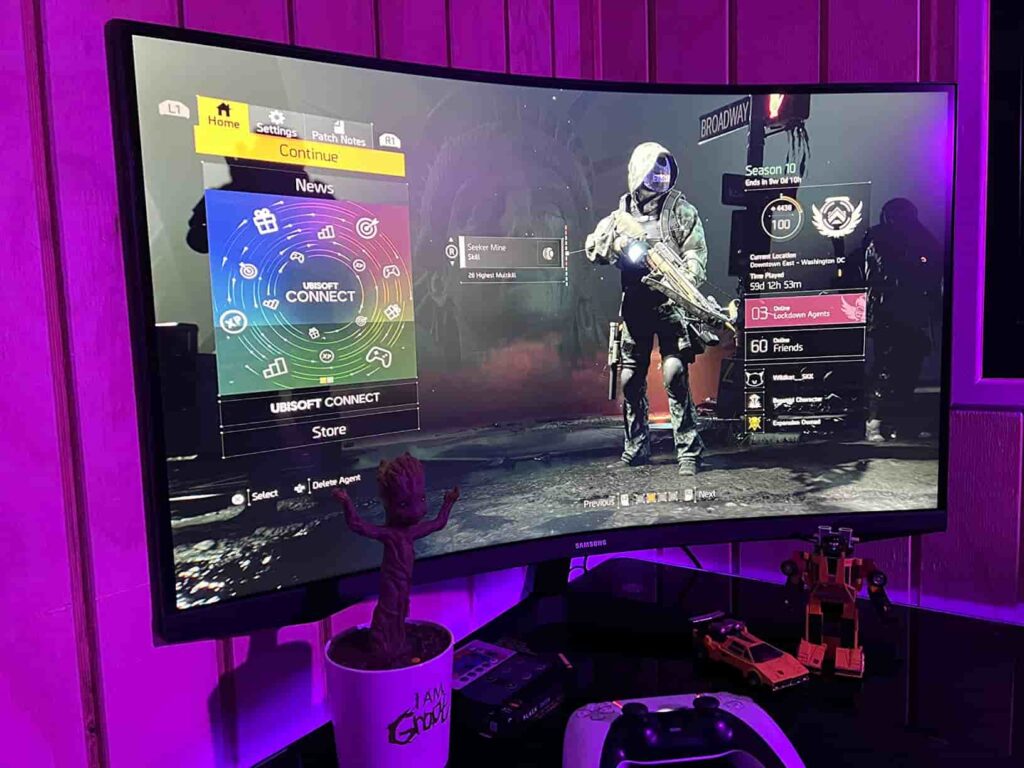
HDR Performance and Brightness
Neither brand will match OLED HDR without a premium price tag. Still, Samsung’s VA panels handle HDR gaming well with better contrast and perceived pop, while LG keeps colors accurate, especially on UltraGear and UltraFine monitors.
Gaming Performance: LG vs Samsung
Refresh Rates and Response Times
Both brands have plenty of high-refresh options. LG’s UltraGear monitors regularly hit 144Hz to 165Hz, while Samsung’s Odyssey G7 and G9 are monsters with 240Hz QHD/Ultrawide setups.
Input Lag and Adaptive Sync
You’ll find FreeSync and G-Sync support on both brands. LG’s IPS panels can edge ahead with slightly faster response times, while Samsung’s VA can exhibit minor ghosting in dark scenes but makes up for it in immersive contrast.
Popular Gaming Models Compared
- LG UltraGear 27GL850: Fast Nano IPS, 144Hz, G-Sync compatibility, praised for gaming and creative work.
- Samsung Odyssey G7: 27” QHD 240Hz, 1000R curve, insane immersion for single-player and competitive games.
“The curve on the G7 feels weird for spreadsheets, but in games, it’s a different level.” – r/Monitors
Productivity and Content Creation
LG shines for multitasking and productivity with its UltraWide monitors and color consistency, which is helpful for creators.
Samsung’s curved options like the Odyssey G9 are fantastic for immersive workflows, but LG often edges out in color accuracy for serious photo or video editing.
Eye comfort features like low blue light modes and flicker-free tech are standard on both, but LG’s ergonomic stands give you more flexibility without instantly needing a VESA mount.
Design and Build Quality
Aesthetics and Build
If you’re setting up your gaming corner or finally upgrading your work-from-home desk, design matters more than you’d think. It’s one of those “you’ll see it every day” decisions.
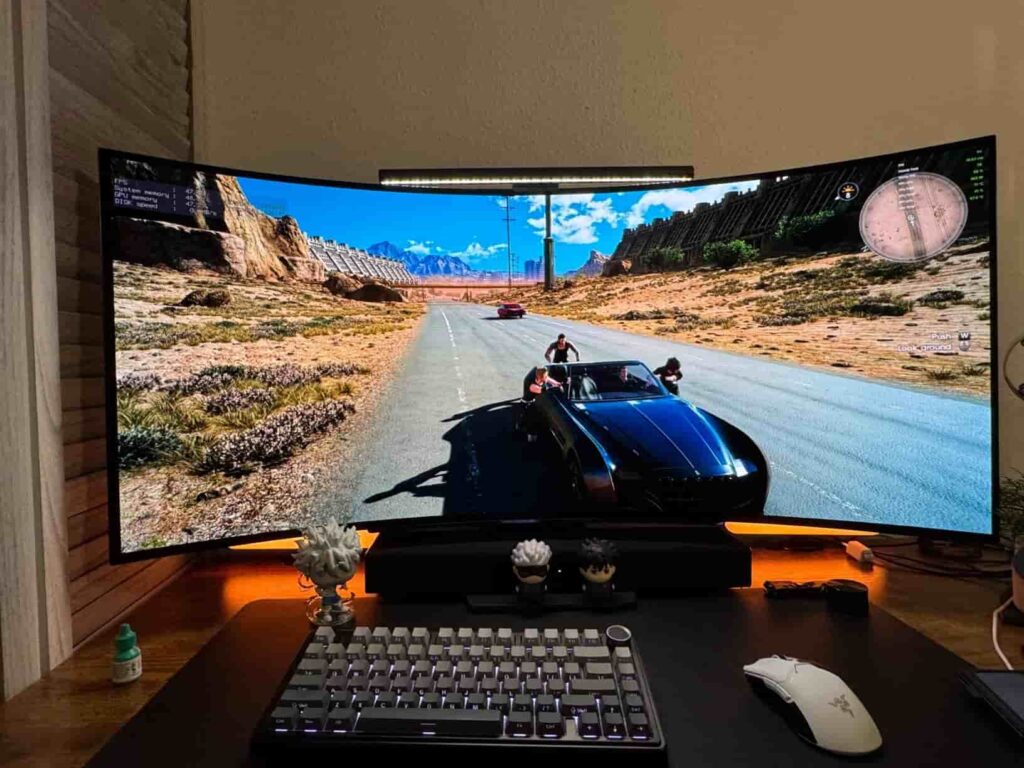
LG’s design language is like a quiet roommate who keeps their side of the desk clean. Most LG monitors, especially the UltraGear and UltraWide lines, come with thin bezels that don’t scream for attention. You get a straightforward, modern look that fits nicely whether you’re pairing it with a gaming rig glowing RGB rainbows or a minimalist productivity setup with a wooden desk and a MacBook.
The matte plastics and subtle curves don’t feel cheap, and their build consistency across models is reliable. One user on Reddit put it well:
“My LG UltraWide just blends into the setup. It’s not trying too hard, and I can focus on work or gaming without distractions.” – u/DeskTidyGuy
Samsung, on the other hand, leans into the flashy gamer aesthetic, especially with their Odyssey lineup. Bold curves, noticeable stands, and clean but aggressive lines. The 1000R curve on the Odyssey G7 or G9 is eye-catching, and it does look cool when you’re sitting down for a late-night gaming session.
That said, Samsung’s productivity-focused monitors (like the Smart Monitor M8) are surprisingly clean, offering pastel colors, slim bezels, and a design that wouldn’t look out of place in a living room or a modern studio.
Stand Ergonomics
If you’ve ever stacked your monitor on a couple of textbooks to get the right height, you’ll appreciate how LG often includes height, tilt, and pivot adjustments even on mid-range models.
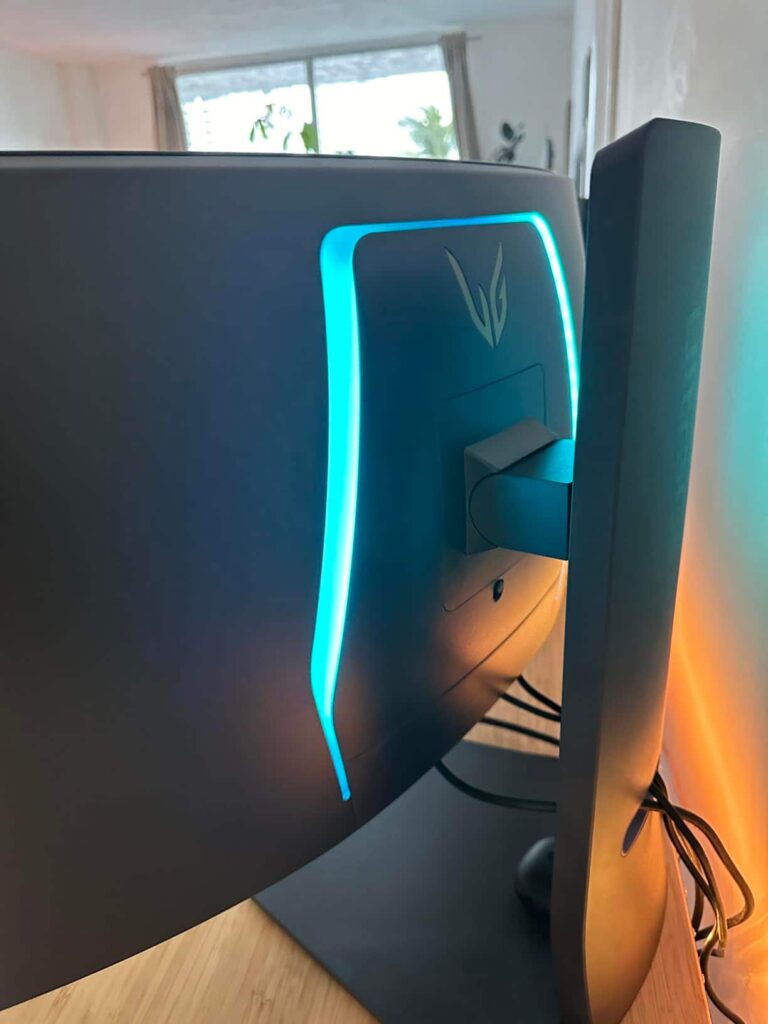
This flexibility matters when you’re spending hours editing, coding, or gaming and need to tweak angles to avoid neck strain. With LG, it often feels like you’re getting ergonomic flexibility without having to immediately hunt for a VESA arm.
Samsung? Well, you’ll often get tilt as standard, but for height and swivel adjustments, you typically need to step up to their higher-end models or be prepared to mount them yourself.
“Love the Odyssey curve, but I had to grab a VESA arm to get the height right.” – Commenter on r/battlestations
The takeaway? LG wins out of the box for ergonomics, while Samsung’s higher-end gaming models can catch up if you invest a bit more or pair them with a monitor arm.
Connectivity and Ports
We’re in the era of “less cable clutter, the better,” and both LG and Samsung understand that.
LG monitors commonly feature DisplayPort and HDMI connections, and you’ll see USB-C with power delivery on many of their productivity-focused monitors. If you’re a MacBook user or like the idea of a single cable charging and displaying, LG’s UltraFine and newer UltraWide models often cover you.
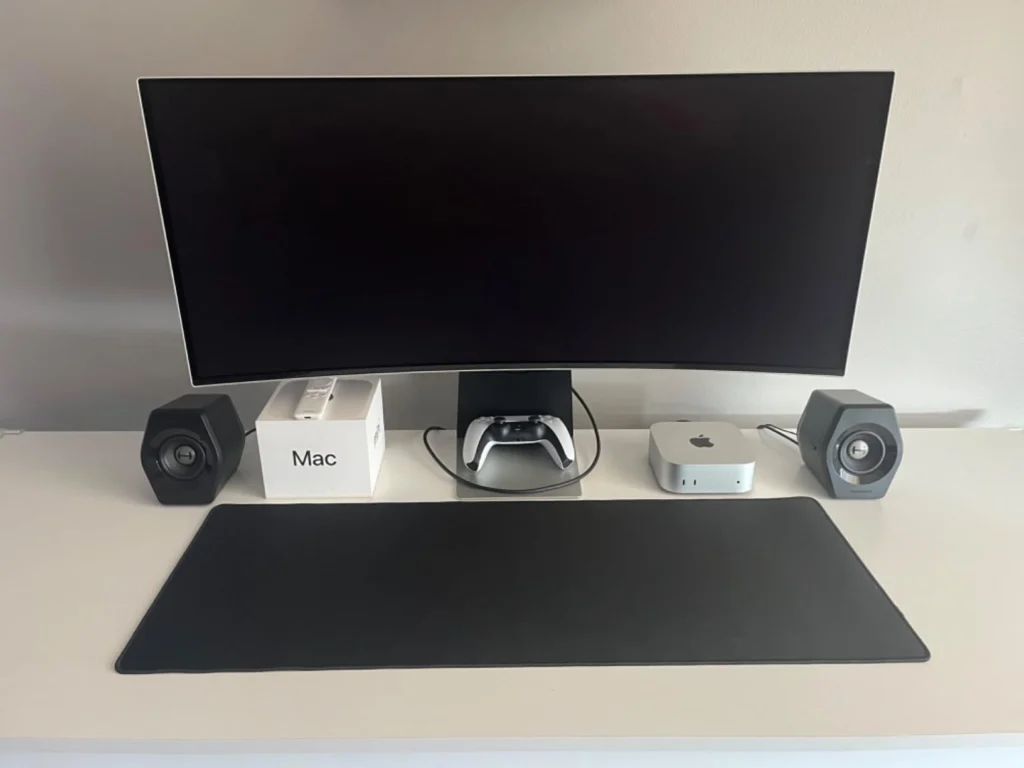
Samsung’s newer monitors are catching up with USB-C integration, but you’ll still find many gaming models leaning on DisplayPort and HDMI. If you’re getting a Samsung monitor for gaming, double-check for DisplayPort 1.4 support to hit high refresh rates at QHD or 4K.
“Plugged my LG UltraWide into my MacBook, one cable, done. Never going back.” – r/macsetups user
Whether it’s LG or Samsung, check the fine print if USB-C or daisy-chaining multiple monitors is part of your workflow dreams.
Popular LG Monitors
LG UltraGear 27GL850
If you’re gaming but also care about color accuracy, the 27GL850 is a sweet spot. It’s a 27” QHD (2560×1440) monitor with a 144Hz refresh rate, fast IPS panel, and G-Sync compatibility. Games like Apex Legends or Valorant feel responsive, while photo edits or video color grading hold up nicely. It’s been a Reddit darling for a reason.
LG 34WN80C-B
A 34” UltraWide IPS with a 3440×1440 resolution that’s a productivity powerhouse. Ideal for multitasking, coding, editing timelines in Premiere Pro, or managing multiple spreadsheets without flipping between windows every five seconds.
LG 32UN650-W
If you’re looking for 4K without breaking the bank, this 32” IPS monitor gives you plenty of screen real estate with solid color accuracy. Whether you’re doing light editing or just want crisp text and YouTube at 4K, it’s a reliable workhorse.
Popular Samsung Monitors
Samsung Odyssey G7
Gamers love this one for good reason. It’s a 27” QHD monitor with a 240Hz refresh rate and a 1000R curve. The curve pulls you into games, making racing and FPS titles like Forza Horizon or CS2 feel more immersive. It also has strong HDR performance for its class, though it shines more in gaming than in productivity.
Samsung Odyssey G5 (32”)
If you want a larger curved screen without spending a fortune, the G5 offers 32” of QHD at 144Hz with a gentle curve that works for gaming and daily browsing. It’s a solid step-up from flat 60Hz panels, especially if you’re coming from older hardware.
Samsung Smart Monitor M8 (32”)
Think of it as a hybrid between a monitor and a smart TV. It’s a 32” 4K monitor that can also run apps like Netflix, YouTube, or Office 365 without a PC. Perfect for tight spaces, bedroom setups, or hybrid living room workstations.
Final Takeaway for Best Monitor Radar Readers
If you’re leaning toward a minimalist desk setup that can handle gaming and work, LG’s clean design, ergonomic stands, and color-accurate IPS panels are a win. The UltraGear line for gaming and UltraWide for productivity are tried-and-true.
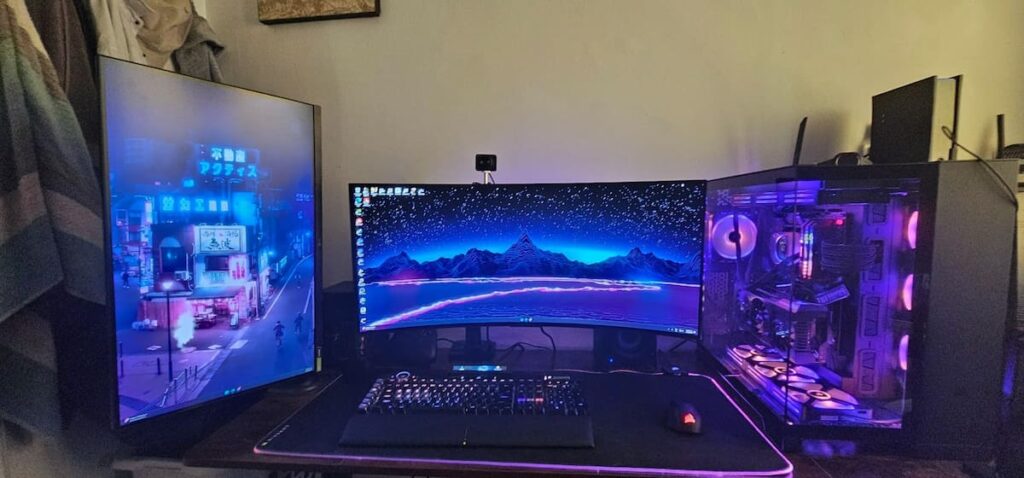
If your focus is deep immersion with curved displays and bold gaming aesthetics, Samsung’s Odyssey monitors will serve you well, with VA panels that excel in contrast and cinematic experiences.
“LG feels like the logical choice when I want to get work done, but for pure gaming, that Samsung curve is hard to beat.” – Discord discussion from a gaming server
Both brands deliver dependable panels, but your choice should align with your desk setup goals, gaming vs productivity needs, and how much you value curve immersion vs color accuracy.
FAQs About LG vs Samsung Monitors
Which is better for gaming?
Samsung for immersion, LG for color speed in competitive gaming.
Which has better color accuracy?
LG, particularly on UltraGear and UltraFine monitors.
Are Samsung curved monitors worth it?
Yes, especially for gaming and media consumption.
Which is better for creators?
LG’s IPS monitors excel in color-critical workflows.
Reference:
- https://www.samsung.com/uk/tvs/tv-buying-guide/what-is-qled-tv/?srsltid=AfmBOoqd0-nvLcGB1nXb0o–y9dFsuZ92cXuZS09gtOTEpj8OGyVQaNm
- https://www.lg.com/us/business/desktop-monitors/Nano_IPS_for_Computer_Monitors
- https://www.samsung.com/us/computing/monitors/oled-monitor/34-odyssey-oled-g8-g85sd-ultra-wqhd-175hz-0-03ms-curved-gaming-monitor-ls34dg856snxza/
- https://www.lg.com/us/monitors/lg-34gs95qe-b-gaming-monitor
